| Attorney General of Ontario | |
|---|---|
_copy.svg.png.webp) | |
| Executive Council of Ontario | |
| Style | The Honourable |
| Term length | At His Majesty’s Pleasure |
| Inaugural holder | John Sandfield Macdonald as Attorney General of Ontario |
| Website | Office of the Attorney General |
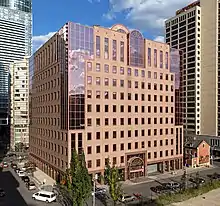
The Attorney General of Ontario is the chief legal adviser to His Majesty the King in Right of Ontario and, by extension, the Government of Ontario. The Attorney General is a senior member of the Executive Council of Ontario (the cabinet) and oversees the Ministry of the Attorney General – the department responsible for the oversight of the justice system in the province of Ontario. The Attorney General is an elected Member of Provincial Parliament who is appointed by the Lieutenant Governor of Ontario on the constitutional advice of the Premier of Ontario.
The goal of the Ministry of the Attorney General is to provide a fair and accessible justice system that reflects the needs of the diverse communities it serves across government and the province. The Ministry represents the largest justice system in Canada and one of the largest in North America. It strives to manage the justice system in an equitable, affordable and accessible way throughout the province.
Doug Downey was appointed Attorney General of Ontario on 20 June 2019, replacing Caroline Mulroney.
Authority
The Attorney General has the authority to represent the provincial government in court personally, but this task is almost always delegated to crown attorneys, or to crown counsel in civil cases. Both Ian Scott and Roy McMurtry, who were prominent courtroom lawyers before entering politics, acted for Ontario in constitutional appeals before the Supreme Court of Canada.[1]
Most holders of the office have been practising lawyers or had legal training. Marion Boyd was the only Attorney General who was not a lawyer until Caroline Mulroney's appointment. Although Mulroney studied and practised law in the United States, she is not legally able to practise law in Canada.
Responsibilities
The Ministry of the Attorney General delivers and administers a wide range of justice services, including:
- administering approximately 115 statutes;
- conducting criminal proceedings throughout Ontario;
- providing legal advice to, and conducting litigation on behalf of, all government ministries and many agencies, boards and tribunals;
- providing advice on, and drafting, all legislation and regulations; and
- coordinating and administering court services throughout Ontario.
The Ontario Crown Attorney's Office, the Office of the Public Guardian and Trustee, the Office of the Children's Lawyer (formerly called the Official Guardian), and the Special Investigations Unit (SIU) all fall within the Ministry's responsibilities. The Ministry also partially funds Legal Aid Ontario, which is administered by an independent board and also receives funding through the Law Foundation of Ontario and from the federal government.
Portfolios
In 2008, Office of the Independent Police Review Director (IPRD) was established under the authority of the AG, as a civilian body with powers invested through Public Inquiries Act to investigate complaints about municipal police forces and the Ontario Provincial Police.[2][3][4]
Following the 2013 release of former Supreme Court judge Frank Iacobucci's report on the relationship between Aboriginal peoples and the Ontario justice system,[5] a position of deputy attorney general with responsibility for Aboriginal issues was created.[6][3]
List of attorneys-general
Attorneys-general of Upper Canada
1. John White (Frontenac County) 1791–1800
2. Robert Isaac Dey Gray 1800–1801
3. Thomas Scott 1801–1806
4. William Firth 1807–1812
5. G. D'Arcy Boulton 1814–1818
6. Sir John Robinson, 1st Baronet, of Toronto 1818–1829, acting AG 1812–1814
7. Henry John Boulton 1829–1833
8. Robert Sympson Jameson 1833–1837, last British-appointed AG
9. Christopher Alexander Hagerman 1837–1840, first Canadian-born AG of Upper Canada
10. William Henry Draper 1840–1841, last AG of Upper Canada
Attorneys-general of the Province of Canada (Canada West)
In 1841, the Province of Upper Canada became the District of Canada West in the Province of Canada
11. William Henry Draper 1841–1843
12. Robert Baldwin 1843–1848
13. William Buell Richards 1848–1854
14. John A. Macdonald 1854–1862, 1864–1867
15. John Sandfield Macdonald 1862–1864
After 1867, the Attorney General position was split into federal and provincial counterparts:
Attorney General of Ontario
Attorney General of Quebec (renamed the Ministry of Justice in 1965)
Attorney General of Canada
Attorneys-general of Ontario, since Confederation
| Portrait | Name | Term of office | Tenure | Political party (Ministry) |
Note | ||
|---|---|---|---|---|---|---|---|
| 1 |  | John Sandfield MacDonald | July 16, 1867 | December 20, 1871 | 4 years, 157 days | Liberal Conservative (MacDonald) |
While Premier |
| 2 |  | Adam Crooks | December 20, 1871 | October 25, 1872 | 310 days | Liberal (Blake) |
|
| 3 |  | Oliver Mowat | October 31, 1872 | July 21, 1896 | 23 years, 264 days | Liberal (Mowat) |
While Premier |
| 4 |  | Arthur S. Hardy | July 21, 1896 | October 21, 1899 | 3 years, 92 days | Liberal (Hardy) |
While Premier |
| 5 | 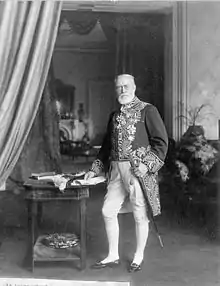 | John Morison Gibson | October 21, 1899 | November 22, 1904 | 5 years, 32 days | Liberal (Ross) |
|
| 6 | 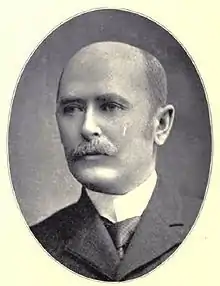 | Francis Robert Latchford | November 22, 1904 | February 8, 1905 | 78 days | ||
| 7 |  | James Whitney | February 8, 1905 | May 30, 1905 | 111 days | Conservative (Whitney) |
While Premier |
| 8 | 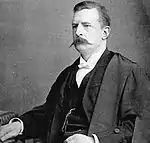 | James Joseph Foy | May 30, 1905 | October 2, 1914 | 9 years, 125 days | ||
| 9 |  | Isaac Benson Lucas | December 22, 1914 | November 14, 1919 | 4 years, 327 days | Conservative (Hearst) |
|
| 10 | 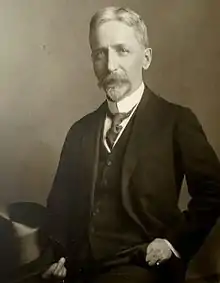 | William Raney | November 14, 1919 | July 16, 1923 | 3 years, 244 days | United Farmers (Drury) |
|
| 11 | 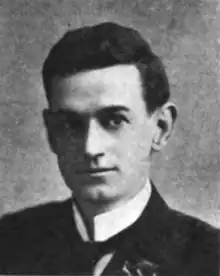 | William Folger Nickle | July 16, 1923 | October 18, 1926 | 3 years, 94 days | Conservative (Ferguson) |
|
| 12 |  | William Herbert Price | October 18, 1926 | December 15, 1930 | 7 years, 265 days | ||
| December 15, 1930 | July 10, 1934 | Conservative (Henry) | |||||
| 13 | Arthur Roebuck | July 10, 1934 | April 14, 1937 | 2 years, 278 days | Liberal (Hepburn) |
Resigned from cabinet to protest Hepburn's handling of the United Auto Workers strike. | |
| 14 | Paul Leduc | April 15, 1937 | October 12, 1937 | 180 days | Interim Attorney General upon Roebuck's resignation, while Minister of Mines | ||
| 15 | 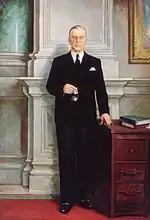 | Gordon Daniel Conant | October 12, 1937 | October 21, 1942 | 5 years, 218 days | Conant remained Attorney General when he served as Premier. He resigned both position on May 18, 1943. | |
| October 21, 1942 | May 18, 1943 | Liberal (Conant) | |||||
| 16 | Eric Cross | May 18, 1943 | August 17, 1943 | 91 days | Liberal (Nixon) |
Concurrently Minister of Municipal Affairs | |
| 17 | Leslie Blackwell | August 17, 1943 | October 19, 1948 | 5 years, 260 days | PC (Drew) |
||
| October 19, 1948 | May 4, 1949 | PC (Kennedy) |
|||||
| 18 |  | Dana Porter | May 4, 1949 | August 17, 1955 | 6 years, 105 days | PC (Frost) |
|
| 19 | .jpg.webp) | Kelso Roberts | August 17, 1955 | November 8, 1961 | 7 years, 69 days | ||
| November 8, 1961 | October 25, 1962 | PC (Robarts) | |||||
| 20 | Fred Cass | October 25, 1962 | March 23, 1964 | 1 year, 150 days | |||
| 21 | Arthur Wishart | March 26, 1964 | March 1, 1971 | 6 years, 340 days | Styled as Minister of Justice and Attorney General from May 18, 1966 | ||
| 22 | Allan Lawrence | March 1, 1971 | February 2, 1972 | 338 days | PC (Davis) |
Styled as Minister of Justice and Attorney General. Also served as Provincial Secretary for Justice from January 5, 1972, to September 28, 1972). | |
| 23 | Dalton Bales | February 2, 1972 | February 26, 1974 | 2 years, 24 days | Styled as Minister of Justice and Attorney General from February 2, 1972, until April 10, 1972. | ||
| 24 | Robert Stanley Welch | February 26, 1974 | July 18, 1975 | 1 year, 142 days (first instance) | Concurrently Provincial Secretary for Justice | ||
| 25 | John Clement | January 14, 1975 | October 7, 1975 | 266 days | Concurrently Provincial Secretary for Justice and Solicitor General (June 18, 1975 - October 7, 1975). | ||
| 26 | Roy McMurtry | October 7, 1975 | February 8, 1985 | 9 years, 124 days | Concurrently Solicitor General (September 11, 1978 – February 13, 1982). The ministry headquarters is named jointly after McMurtry and Ian Scott | ||
| 24 | Robert Stanley Welch | February 8, 1985 | May 17, 1985 | 98 days (second instance) (1 year, 240 days in total) |
PC (Miller) |
Cocurrently Deputy Premier | |
| 27 | Alan Pope | May 17, 1985 | June 26, 1985 | 40 days | |||
| 28 | Ian Scott | June 26, 1985 | October 1, 1990 | 5 years, 97 days | Liberal (Peterson) |
Concurrently Minister Responsible for Native Affairs, interim Solicitor General (February 3, 1986 – January 9, 1987; June 6, 1989 – August 2, 1989). The ministry headquarters is named jointly after Scott and Roy McMurtry | |
| 29 |  | Howard Hampton | October 1, 1990 | February 3, 1993 | 2 years, 125 days | NDP (Rae) |
|
| 30 | Marion Boyd | February 3, 1993 | June 26, 1995 | 2 years, 143 days | Styled as Minister of Justice and Attorney General. First woman to serve as Attorney General. Only Attorney General who was not a lawyer. | ||
| 31 |  | Charles Harnick | June 26, 1995 | June 17, 1999 | 3 years, 356 days | PC (Harris) |
Concurrently Minister Responsible for Native Affairs |
| 32 | 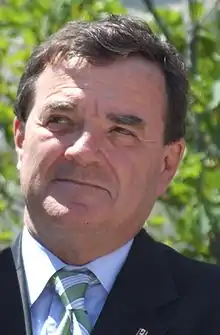 | Jim Flaherty | June 17, 1999 | February 7, 2001 | 1 year, 235 days | Concurrently Minister Responsible for Native Affairs | |
| 33 | David Young | February 8, 2001 | April 15, 2002 | 2 years, 17 days | Concurrently Minister Responsible for Native Affairs | ||
| April 15, 2002 | February 25, 2003 | PC (Eves) | |||||
| 34 | Norm Sterling | February 25, 2003 | October 22, 2003 | 239 days | Concurrently Minister Responsible for Native Affairs | ||
| 35 | Michael J. Bryant | October 23, 2003 | October 30, 2007 | 4 years, 7 days | Liberal (McGuinty) |
Concurrently Minister Responsible for Native Affairs and Minister Responsible for Democratic Renewal (October 23, 2003 – June 29, 2005). | |
| 36 | Chris Bentley | October 30, 2007 | October 20, 2011 | 3 years, 355 days | Concurrently Minister Responsible for Native Affairs (January 18, 2010 – October 20, 2011) | ||
| 37 | John Gerretsen | October 20, 2011 | February 11, 2013 | 2 years, 156 days | |||
| February 11, 2013 | March 25, 2014 | Liberal (Wynne) | |||||
| 38 | Madeleine Meilleur | June 24, 2014 | June 13, 2016 | 1 year, 355 days | Concurrently Minister Responsible for Francophone Affairs. First francophone to serve as Attorney General. | ||
| 39 | .JPG.webp) | Yasir Naqvi | June 13, 2016 | June 29, 2018 | 2 years, 16 days | First visible-minority and first Muslim to serve as Attorney General. | |
| 40 | .jpg.webp) | Caroline Mulroney | June 29, 2018 | June 20, 2019 | 356 days | PC (Ford) |
Concurrently Minister Responsible for Francophone Affairs. |
| 41 |  | Doug Downey | June 20, 2019 | present | 4 years, 203 days | ||
See also
References
- ↑ 1976 Reference re: Anti-Inflation Act, 1981 Reference re: Resolution to amend the Constitution, and Reference re Bill 30, An Act to Amend the Education Act
- ↑ "Gerry McNeilly Nominated As Director Of New Police Review System". news.ontario.ca. May 2, 2008. Retrieved December 30, 2018.
- 1 2 Wallace, Kenyon (July 24, 2010). "Police complaint director thrust into limelight". National Post. Retrieved December 30, 2018.
As the province's newly minted Independent Police Review Director, Mr. McNeilly is tasked with handling all public complaints against police in Ontario
- ↑ McNeilly, Gerry (December 2018). Broken Trust: Indigenous People and the Thunder Bay Police Service (PDF) (Report). Toronto, Ontario: Office of the Independent Police Review Director (OIPRD). p. 208. Retrieved 30 December 2018.
- ↑ Talaga, Tanya (February 2, 2013). "Ontario's justice system in a 'crisis' for aboriginals: Frank Iacobucci report". The Toronto Star. Toronto. Retrieved December 30, 2018.
- ↑ Guttsman, Janet (June 1, 2015). "A new portfolio". Canadian Lawyer Magazine. Archived from the original on April 30, 2016. Retrieved January 4, 2017.
.svg.png.webp)